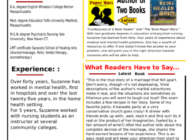
Since authors spend a great deal of time and effort — along with money — to write and publish their books, learning how to write a quality book review is one of the best ways for readers to express their appreciation and offer constructive feedback. Please note, I called it constructive feedback — not criticism for criticism’s sake. For potential new readers, a thoughtful review can make the difference between buying a book or clicking on the next title in their search for reading material worthy of an hour or more of their time.
What elements comprise a quality book review?
First, let’s define a bad book review. No, I’m not referring to legitimate criticism of characters, plot, pacing, writing, or any other vital aspect of a compelling story. I’m talking about generic reviews like, “I loved the book!” or “Wow, this is excellent!” or “This book is a must-read!” that omit any substantive descriptions as to why the reviewer feels that way. Conversely, the same principle applies to pithy one-or-two sentence reviews like, “Awful book!” “I can’t believe anyone would write this drivel!” or “Don’t waste your time reading.” Well, give a specific reason (or two, or three) as to why no one should bother with that particular book or you run the risk of looking like a troll who’s just shooting someone down for fun.
It doesn’t matter if it’s high praise or caustic criticism, the reviewer does the author (and his or her potential readers) a disservice by omitting specifics. Whether you love or hate a book (or fall somewhere in-between), here are some guidelines on how to write an effective, useful review for both authors and readers.
- Demonstrate You Have Actually Read the Book– sounds counter-intuitive, but I’m not advocating that reviewers should give away spoilers. However, it is possible to mention a few specifics about what you liked about the main character, themes, narration, dialogue, etc. What did you like or dislike about the protagonist or supporting characters? Why did the plot draw you in? Was the book thought-provoking? Edgy? Enlightening? Why? Even if you select just one aspect and explain why it had an impact on you, for better or for worse, it will demonstrate your knowledge of the book.
- Offer a Balanced Perspective– as I mentioned, a great deal of time and energy goes into the production of a book. Whether you rate it 5-stars or 3-stars (more on that in point #4), identify what the author does well and the areas in which he or she could improve. Is the dialogue stilted but the prose captivating? Say so. Is the pacing too slow? Too fast? Explain why and give an example. Is a character well defined or one-dimensional? Offer a specific example that supports your opinion.
- Limit Your Review to One-to-Three Paragraphs– for maximum impact, keep it pithy. Select a few qualities about the book that stood out to you, whether it involves a secondary character, a particular scene, or the overarching themes. Again, you don’t want to give away spoilers; you want to focus on your most indelible impressions of the book. No one wants to read a lengthy, rambling review, and from a copywriting/marketing perspective, such reviews do more harm that good. The objective is to provide constructive criticism and/or genuine praise to better inform the author and prospective readers.
- Give the Author at Least 3 Stars– here I am taking my cue from author Daniella Bova, who states at her blog DaniellaBova.com, “Authors put their heart and soul into their writing, so I will never give any book less than 3 stars. I just won’t review it at all.” Words to live by. If you really hate a book for whatever reason (poorly written, plot holes, undeveloped characters, etc.), it’s best to heed our mothers’ advice, “If you can’t say anything nice, don’t say anything at all.” Instead, contact the author privately (if they’ve made their email public or have a public Facebook page where you can message them) and share your thoughts. By doing so, you’ll help them improve their writing skills while saving them the embarrassment of a 1-or 2-star public review. Do unto others, as you’d have done to you, after all.
Here’s an example of a thorough book review:
Water Signs was one of those rare books that I had to force myself to put down because it was such an engaging, refreshing read. I enjoyed the fact that the story was set around the Jersey shore, as I am a Jersey girl myself. But what truly kept me reading was that Daria put so much life into her characters! Their personalities, their personal convictions, and their sense of family were so palpable that every time I read a page, it was like coming home to friends. The story kept me hooked all the way through, allowing me to experience Ken and Maddy’s life journeys along with them right on to the very end. If you are searching for a truly good book that will leave you satisfied, Water Signs is definitely worth every penny!
Full Disclosure: I am the author of Water Signs and host of Your Book Your Brand Your Business. The book review above is one of my favorites for the reasons I described in this post. Happy reading…and don’t forget to write a quality book review for the author!




